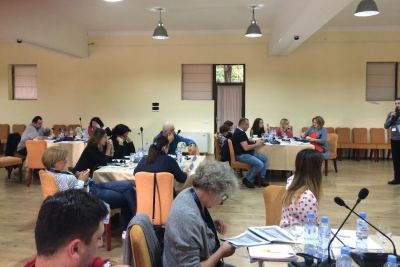Building capacity of partners in supporting IDP women’s engagement in sustainable livelihood initiatives
Date:
In order to enhance the knowledge and skills of partners in developing, implementing and monitoring gender sensitive livelihood support programmes, UN Women organized a three-day intensive training on “Enhancing IDP Women’s Sustainable Livelihoods: Approaches, Tools and Interventions” for the Ministry of Internally Displaced Persons from the Occupied Territories, Accommodation and Refugees of Georgia (MRA), its IDP Livelihood Agency (Livelihoods LEPL), the Agricultural Cooperatives Development Agency (ACDA), and members of civil society organizations (CSOs).

Training on Enhancing IDP Women's Sustainable Livelihoods for the Ministry of Internally Displaced Persons from the Occupied Territories, Accommodation and Refugees of Georgia, IDP Livelihood Agency, the Agrocultural Cooperatives Development Agency and members of civil society organizations; Photo: UN Women
“The training, especially the part on the theoretical frameworks and conceptual definitions of sustainable livelihoods, proved to be very interesting and enriching,” noted Irakli Ujmajuridze, Director of the Livelihoods LEPL. “The practical exercises were also designed in a way that the LEPL can apply the recommendations generated from the group work in our everyday work.”
By the end of the training period, the participants had enhanced their understanding of what sustainability is and what makes livelihoods sustainable; increased their comfort level with gendered perspectives of sustainable livelihoods; improved their practical experience in assessing IDP livelihoods with a gender lens; and explored innovative ways to strengthen livelihoods in IDP communities. Thus, the partnering departments and organizations are now in a position to contribute to improving the economic capacity of the most vulnerable IDPs, especially women and girls.